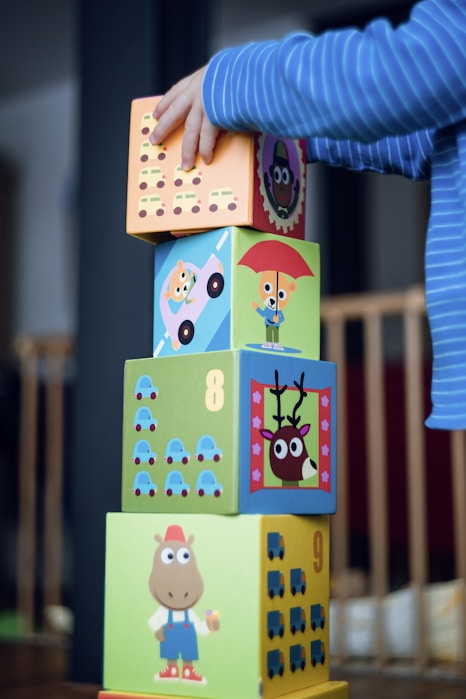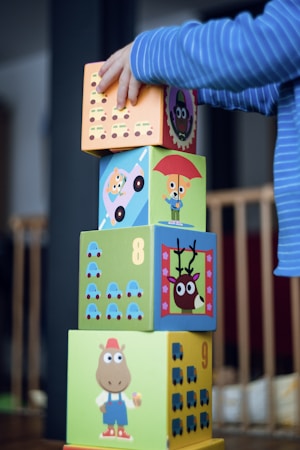The Five Stages of Language Acquisition
... and the biggest mistake you can make
Bálint Gáspár
3/19/20236 min read
Stage 1. Total Physical Response
Have you ever noticed how much easier it is to remember something when you physically interact with it? That's the basic idea behind the Total Physical Response (TPR) method of language teaching. Developed by James Asher in the 1970s, this method encourages students to associate physical movement with language learning. Here's how it works: the teacher gives commands or instructions in the target language, and the students respond with physical actions. So, if the teacher says "Stand up," everyone stands up. If the teacher says "Walk to the door," everyone walks to the door. By connecting the language with physical actions, students are better able to internalize the language and remember it more effectively. TPR is especially useful for beginners who are just learning basic vocabulary and grammar structures. It's also great for young children who love to move and play while they learn. But don't think that TPR is just for kids - adults who are new to a language can benefit from the method as well. It's a fun and engaging way to build confidence and get comfortable using a new language.


TPR is amazing because it removes the anxiety of speaking a new language by allowing students to respond physically, but the teacher can still verify comprehension by ensuring that the physical actions were executed correctly, making it a useful tool to ensure close to 100% comprehension. As a TPR teacher, if you ask your student to bring you the blue pen and they end up doing a backflip, it's a pretty good indicator that they didn't quite understand your instruction. And as such, it's the teacher's fault. I suggest you to spend 100-150 hours on this stage. If you want to learn on your own, you can find TPR videos online, but if you want a teacher's help, be sure to ask for the initial lessons to be done this way. Making mistakes along the way is inevitable, but it is easy to maintain the level of understanding above 90% during this stage, as immediate feedback is part of the method.
Stage II. Super beginner videos
You can get here really fast and here you still have visual crutches and the vocabulary itself is still extremely easy. It depends of course on the language you are learning and whether there are enough videos for super beginners in your target language, the most challenging part of learning a language is getting to the point where you can understand videos that are relevant to your life, and maintaining the motivation to get to that point. A helpful factor in super beginner videos is that content creators often use the most common words and phrases, and supplement them with visual aids like drawings and wide gestures, which can help learners understand the meaning without relying solely on words. This approach helps to take the weight off the shoulders of words and can make language learning more enjoyable and effective. I suggest you to spend 200 hours on this level.
Stage III. Beginner videos and comics
If you reach this stage it means you have 300-350 comprehensible input behind you, and you hopefully haven't read too much in your target language, avoiding the failure to connect foreign words with the pronunciation of your native language.
However, now we are ready to to take the next step and we can start reading, because after ~300 hours input you have a basic sense of the pronunciation of those words you are going to read. We still need visual clues, so for this very reason, I recommend you to start with comic books, but comic for children. Nowadays it's easy to make the mistake of choosing a comic for adults with more complex language. I committed the error of buying a comic about the notorious Valencia metro accident, which had language language more like a serious novel, full of legal and political terms, saying that spaced repetition will help and I can figure the words out from the context alone. Spoiler alert, I could not. :D
After one year of dedicated but slow development, I came to the conclusion that the most important thing in language learning with comprehensible input is to keep your input as comprehensible as humanly possible. The absolute best would be over 90%, but never-ever below 80% of understanding. You should never consider a material (video, book, podcast, movie, series) below 80% of comprehension, comprehensible input.
I suggest you to spend at least 200 hours on this stage.
Stage IV. advanced videos and simple books
It is safe to say that with each stage, the whole process will be more and more enjoyable. You are getting closer to those videos, books, podcast you would consume anyway in your target language. But let's not get too ahead of ourselves. We are at the stage where you can start experimenting with everyday videos. How to fix this and that? Video critics about movies you recently watched and so on. The key is to have content that is 100% relevant to your life. We are only one level away from replacing our mother tongue with the new target language we are currently learning. You are almost ready to drop your visual crutches. It's time to start experimenting with easier podcasts, like the easy languages podcasts. (easy german, easy spanish, easy english ... ) Actually this is the stage where you can come back anytime you want. For example I still listen to Easy German even if my understanding is between 95-100%. And I think this is what most people get wrong about language learning. Just because you understand a grammatical structure doesn't mean you can use it confidently and exactly for this very reason I still listen to these podcasts. You can start to read easier books for pleasure. In my humble opinion, at this level we can safely say that you have won the language game. If you pick your content wisely, you get so much pleasure out of the process, that you'll find it super easy to stay on track for 250 more hours and the transition to level 5 will be nearly effortless.
I am about to write something that you don't hear very often: This and ONLY this level is where you can first start learning grammar. At this level, roughly 800 hours of comprehensible input passed through your ears. You've got the skeleton on which you can hang the grammar without causing frustration. It may sound strange at first, but you learned your mother tongue the same way and it's no coincidence that it feels so much like your own.
This is the level where you can pretty much do anything what you would do in your native language. I am happy to say, that I am on this level on three languages, which means I can operate my job in Hungarian, English and German and I am not going to lie, it feels amazing and causes a weird kind of addiction. My Spanish is on stage III. and I can tell pretty accurate when I reach stage IV and it is a wonderful, relieving feeling.
I love to consider language learning as raising a child. I can't help but laugh at the marketing lies this industry feeds its customers. Let's play a game to shed some light on the problem. In language learning advertising slogans, I replace language learning with raising a child to expose the lies behind the hype and make them even more ridiculous. Let's see.
Can you raise a child in 30 days? Yes, learn more about the secret.
12 rules to bring up your child faster.
The fastest way to raise your child.
From baby to adult in 3 months.
I hope I could make my point. Human languages are more complex than we could learn in such a short period of time. The human brain contains around 100 billion neurons, each with an average of 1000 to 10000 connections with other neurons. When learning a new language, the brain must create new connections and pathways between neurons to store and retrive the new information, which can involve the growth and strengthening of existing connections as well as the formation of new ones. And it.takes.time.
Of course you can speak Tarzan in a couple of weeks if that's your goal and nothing is wrong with that. But please bear in mind that this will damage the fluency in the long run. And of course I also use catchy titles sometimes because it sells the click and I need to be tricky to get your attention in this enormous noise to deliver you the right content. However my intention is to give you the key to be fluent.
Your only goal on this level is to stay here for a couple of years. Make it comfortable because you are going to spend a lot of time here to reach the absolute native-like level. It takes normally 8-10 years. Strictly speaking, this level can no longer be considered learning you just live your life through the target language. Only the time works here, and smart people let the time work for their benefit. 😉 I learn German every day at my job and I get paid for it. I would say it's quite convenient and I have no reason to mind spending another 8-10 years here.
Stage V. Congratulations!! 🥳 👏 🎉 You have the language
Make it stick!
I understand that it might seem overwhelming at first, but don't worry, you don't have to understand everything right away. I believe, it's important to have a good understanding of something in order to really learn it well, especially when it comes to complex concepts (and trust me, it's going to be complex!). That's where the power of time comes in. Sometimes all you need to do is take some time to break it down, read and digest the information, and then take a break. After that, you can come back to it and re-read, applying your new experience to the concept. You can keep doing that, re-reading and tweaking until you really get a handle on it and feel confident in your understanding. It might take some time and patience but you can do it! 💪
I might layout a concept starting with idea A, then move on to B, then C, and then D. But, everyone's brain works differently, and for you, it maybe makes more sense if we start with B, then talk about A, then move on to C, go back to A again, and then finish with D. That way, your brain can make better sense of the information and make more connections.
I highly recommend downloading the free app and saving the link to this blog post in your schedule. This is because I genuinely believe it will be helpful for you and I truly care about your success. By saving the link and accessing it through the app, you can review the information whenever you have a spare moment and reinforce your understanding. It's a small step, but it can make a big difference in your learning journey. So please, take my advice to heart and give it a try!
Stay in the game, there are many more articles to come! 😉